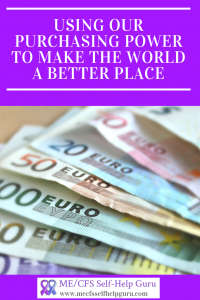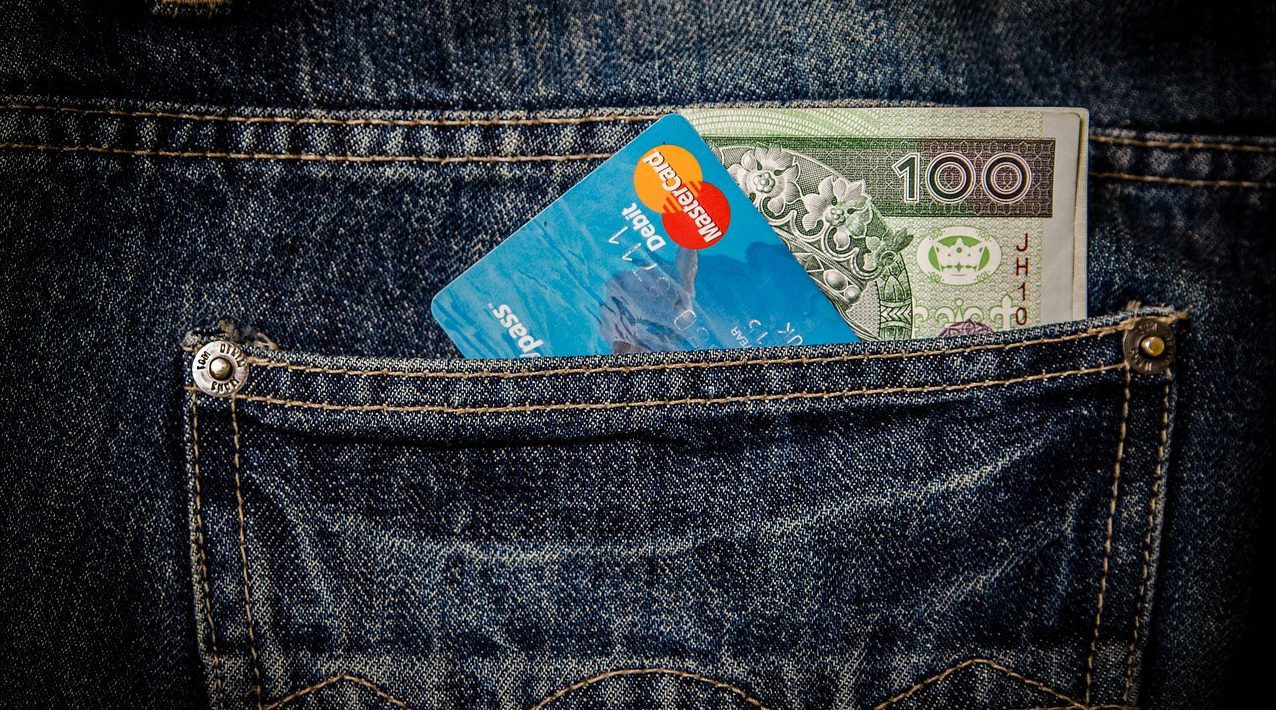The choices we make about how we spend our money have a huge influence on the world. Our choices determine how things are produced, who gets paid and how much, how far things have to travel and how well workers are treated. However, we tend to focus only on what we want to buy generally ignoring the fact that everything we spend money on will have an impact on people and the planet. What if we brought more awareness into those decisions? What if, little by little, we started using our purchasing power to make positive change in the world?
As a person with chronic illness I don’t necessarily have a great deal of energy to be an activist. I also have a much-reduced income because of my inability to be formally employed. However, 15 years of chronic illness have taught me that happiness has nothing to do with material goods. I’ve learned that I can be happy with a lot less, which means I can pay a little more for things that I know will have a more positive impact (or a less negative one). Some of my changes have come from needing to minimise my toxic load. But I’ve also had a little more time to think about things and I know that it doesn’t take too much extra energy to open up my awareness to the impact of how I spend my money. While this could be quite depressing and a huge responsibility, I’ve decided to take a positive approach of valuing every tiny choice I make that could have a better impact on the world. I make sure I let go of the weight of choices that don’t have the best impact as long as I am doing what I can when I can without any stress or pressure.
Here are the some of the ways I try to exert my purchasing power:
Choosing local:
Things that are locally produced have a lower carbon footprint and are employing local people. I like to support the fortnightly local produce market and the local crafts people in any way I can. I also aim to support local businesses, especially when it means that the things that I need regularly are more easily available to me. For example, there is a local health food shop in the village that sells a lot of unpackaged and organic goods. The prices are quite a bit higher than at the one in the market town 20 miles away. However, by paying those prices I’m supporting the local family who run the business, the village has a little more charm for the tourist (who are also being exposed to new ideas when they are relatively relaxed) and by helping to keep the shop going I have the things I need whenever I want them without having to waste a day’s worth of energy on a shopping trip to the market town.
Choosing Respectful/Ethical:
I was bought up highly valuing how skilful you could be at making your money stretch. Being able to root out a bargain and find the lowest price for an item was a highly prized skill. I had no awareness of what it meant when a product was ridiculously cheap. While there is demand for cheap products that are produced with no attention to how much they damage the environment, or the ways the people in less developed countries are exploited, greedy CEO’s will continue to get rich without blinking an eye. If we collectively showed these CEO’s that only respectfully/ethically produced products were acceptable for purchase, they would have to change their ways to continue to be successful, and let’s face it, it’s all about success to them! When they notice their products are being rejected, they will look for a solution, so let’s reject their products whenever we can find an alternative. One of the reasons I pay the prices of doTERRA essential oils is that I know that they are respectfully produced and are supporting communities in any disadvantaged areas where the plants are grown.
Choosing minimal packaging:
Similarly, if sales drop on over-packaged goods, the companies will rethink their packaging. Signing petitions can help change legislation, but purchasing power can hit companies where it hurts. Simply reject any overpackaged goods if there is any kind of alternative!
Reduce, reuse, recycle:
When we reduce, reuse and recycle, we spend less and thus can afford to spend more consciously. I have a policy now that I never buy a new item of clothing unless it’s something that I absolutely love and know that I will love for a long time. All my other clothing (apart form underwear) comes from charity shops. If you want to experiment with a new look, colour or style, charity shops are great, because if you decide it’s not for you, you can re-donate and pass it on. I’ve also realised that I need far fewer clothes than I ever thought. Especially as I spend most of my day each day in comfortable lounge clothes.
Freecycle is another great resource for reducing waste, saving precious resources and easing the burden on landfills. Check it out before thinking you have to buy something new or throw something that still functions away!
Food waste is another real issue. If you’re throwing a lot of food away each week, you’re also throwing away the energy that went into producing and packaging that food. And if you buy a little less you will be able to afford the higher prices of the locally produced, environmentally friendly, organic wholefoods!
Careful gifting
The holiday season is a time that we can be particularly careless about our spending because of the pressure and stress of gift giving. I have reduced my gift giving to the absolutely necessary. My close family and very close friends. If you don’t know someone well enough to be able to buy them something that they will love and use, then you shouldn’t be pressured into buying them a holiday gift. See Martin Lewis’s blog about banning unnecessary Christmas presents. If you are gifting to people you don’t know so well, choose something that gives twice and supports a local business or craftsperson or perhaps someone with a chronic illness.
Support Spoonie Entrepreneurs:
Could what you need be supplied by another spoonie who’s running their business from home in order to fit their work around the demands of their illness? Helping another spoonie survive is a great way to exert your purchasing power. Here is just a handful of spoonie run enterprises.
- Concious Crafites
- Home Made Jewelry by Pamela Jessen
- Spoonie Survival Kits
- Hand Made by Holly
- Graphic Organic
- Melissa v Fibromyalgia Shop
- Achy Smile Shop
And if you’d like to support me, perhaps you could encourage a loved one to buy you a coaching pack (win-win!), or maybe you could sign up as a dõTERRA wholesale customer with me as your wellness advocate. Some of the enrolment kits could even be split up and given away as gifts. And if you sign up by the end of November, you’ll get 50 extra points to spend on future purposes. There’s also an amazing 200 point giveaway this month! Contact me and we’ll set up a call so I can help you find the best way for you!





